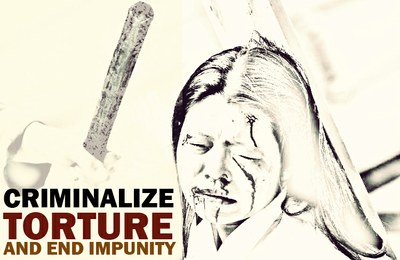PAKISTAN: Make law to criminalize custodial torture
by Bushra Khaliq
Torture in police custody is a serious problem in Pakistan, rupturing the serious standards of social contract between the state and society. The menace of custodial torture has become endemic and adversely impacts on the individuals as well as society as a whole. This results in the loss of rule of law and the people’s trust in the law enforcement agencies. Custodial torture is state-sponsored violence and a colonial legacy which the State of Pakistan uses to govern the masses. Judicial remand of an accused is a formal and so-called main tool through which accused persons are routinely tortured to extract forced confessions.

© AHRC/ALRC
At present there is no law to criminalize custodial torture in Pakistan – a reason giving rise to incidents of unabated torture in police custody. Security force personnel in Pakistan are quite accustomed to torturing persons in custody. Third degree methods like beating; burning with cigarettes, whipping the soles of the feet, prolonged isolation, electric shocks, denial of food or sleep, and hanging upside down, are frequently used in detention centers. It is rare that any action is taken against the police or security personnel involved in torture.
Thousands of cases of torture in police custody are reported every year. There are more 1,300 police stations in the country and it can be safely assumed that on average at least one person is tortured at each police station on daily basis, making it over 1000 persons tortured daily in Pakistan. Sexual violence is also reported by up to 70 per cent of women in police custody, along with violations of their basic human rights. Similarly dozens of journalists, writers, HR defenders, students and political activists reportedly face the worst forms of torture every year.
Even, after the ratification of UN-CAT in 2010 by the government of Pakistan the situation of custodial torture shows an increasing trend. Since the latest data on torture in not available, thus for the sake of analysis we can refer figures gathered in the recent past by different organisations. For instance the data collected during year 2012 by the Madadgar Helpline, indicate that 2053 cases of torture were recorded, out of which 1284 were women[1]. Similarly per study, conducted by DCHD in 2013, more than 57 percent accused of crimes were tortured in police custody and the families of 51 percent of the accused paid the police not to torture their loved ones.[2]
The above-mentioned torture figures are indicative of the sad state of the main pillars of the criminal justice system; prosecution, police, judiciary and prison, which have failed in their duty towards the state and society. Pakistan must wake up to its sovereign responsibility to reform its criminal justice system compatible to international standards for fair trials.
The situation of awareness about UNCAT is also depressing. People consider an investigation by the police as a form of “punishment”, and their diminishing faith in the justice system has led them to consider that police stations are no longer a place to get justice. The vast majority of the people have never heard about the UN Convention against Torture.
It is four years since the ratification of the UN convention in June 2010. The government has not taken “any visible efforts on CAT”. Besides an introduction of some sections in the Police Order 2002, and a few amendments in the criminal laws, no serious efforts have been made to give effect to the CAT. Mere ratification of the UN convention is not sufficient, as torture is a practice deeply entrenched in the law enforcement system.
Despite persistent demands by the Anti-Torture Alliance (ATA) Pakistan and other civil society organizations the Ministry of Human Rights and Government of Pakistan seem little interested in taking serious steps for legislation against torture. Instead of performing its international obligations on UNCAT; to make laws for ending custodial torture, the current government is planning to snatch the rights of the accused, whatsoever, through introduction of “Pakistan Protection Ordinance”, investing unbridled powers in law enforcing agencies of detaining the accused up to 90 days without formal arrest.
A democratically elected government is doing this in the name of combating terrorism in the country. However, there is a strong likelihood of the use of such draconian laws against human rights defenders, social & political activists and opponents of the government for their victimisation. It is, therefore, imperative for the civil society and human rights defenders to forge unity among their ranks and defiantly oppose government intentions and initiate solid steps to protect victims of torture by highlighting the issue and standing up against the menace by demanding effective law to curb torture in custody.
Bushra Khaliq is the Executive Director of Women in Struggle for Empowerment (WISE), she written this article exclusively for AHRC. She can be reached at bushra.khaliq1@gmail.com
[1]http://pakistan.onepakistan.com.pk/news/city/karachi/157965-16198-cases-of-violence-reported-in-11-months-madadgar.html
[2]www.dchd.org.pk/component/content/article/2-uncategorised/44-national-campaign-against-torture.html



